Jianyong Jiang
Physics-Constrained Diffusion Reconstruction with Posterior Correction for Quantitative and Fast PET Imaging
Aug 20, 2025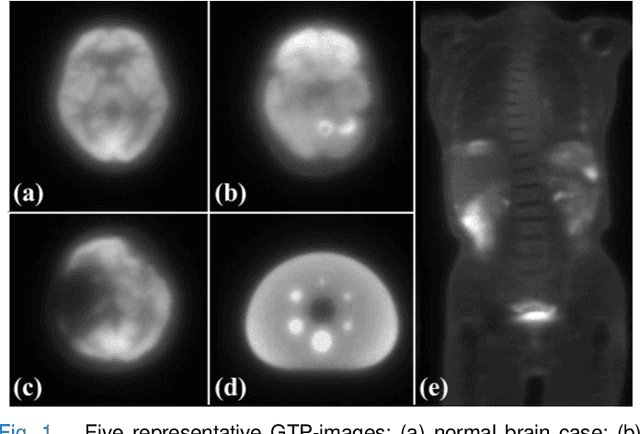
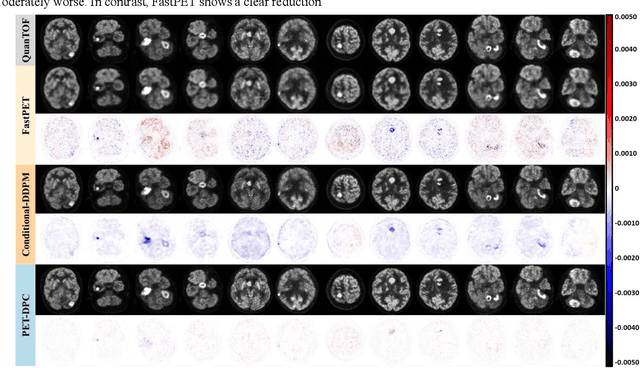
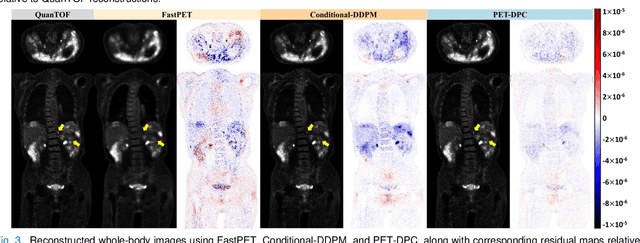
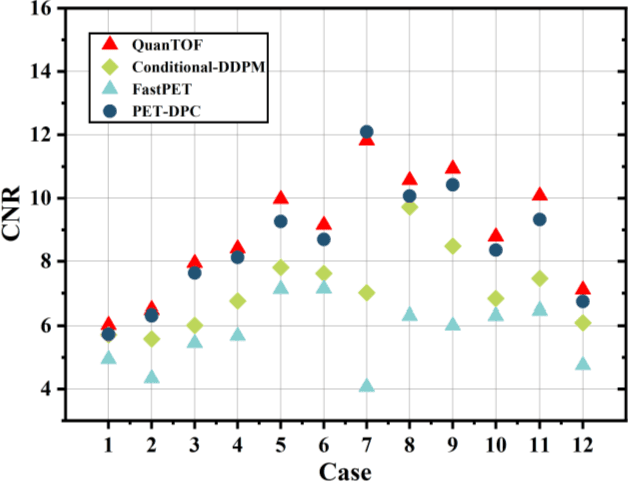
Abstract:Deep learning-based reconstruction of positron emission tomography(PET) data has gained increasing attention in recent years. While these methods achieve fast reconstruction,concerns remain regarding quantitative accuracy and the presence of artifacts,stemming from limited model interpretability,data driven dependence, and overfitting risks.These challenges have hindered clinical adoption.To address them,we propose a conditional diffusion model with posterior physical correction (PET-DPC) for PET image reconstruction. An innovative normalization procedure generates the input Geometric TOF Probabilistic Image (GTP-image),while physical information is incorporated during the diffusion sampling process to perform posterior scatter,attenuation,and random corrections. The model was trained and validated on 300 brain and 50 whole-body PET datasets,a physical phantom,and 20 simulated brain datasets. PET-DPC produced reconstructions closely aligned with fully corrected OSEM images,outperforming end-to-end deep learning models in quantitative metrics and,in some cases, surpassing traditional iterative methods. The model also generalized well to out-of-distribution(OOD) data. Compared to iterative methods,PET-DPC reduced reconstruction time by 50% for brain scans and 85% for whole-body scans. Ablation studies confirmed the critical role of posterior correction in implementing scatter and attenuation corrections,enhancing reconstruction accuracy. Experiments with physical phantoms further demonstrated PET-DPC's ability to preserve background uniformity and accurately reproduce tumor-to-background intensity ratios. Overall,these results highlight PET-DPC as a promising approach for rapid, quantitatively accurate PET reconstruction,with strong potential to improve clinical imaging workflows.
Cycle-Constrained Adversarial Denoising Convolutional Network for PET Image Denoising: Multi-Dimensional Validation on Large Datasets with Reader Study and Real Low-Dose Data
Oct 31, 2024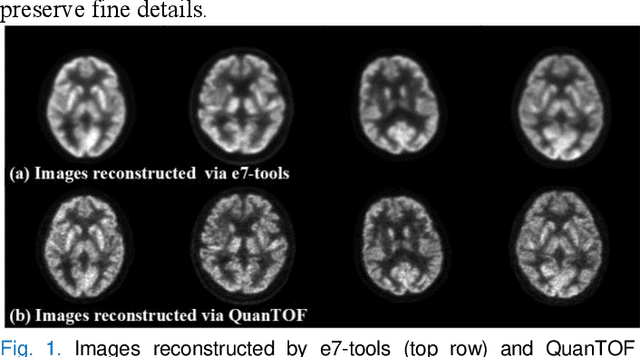
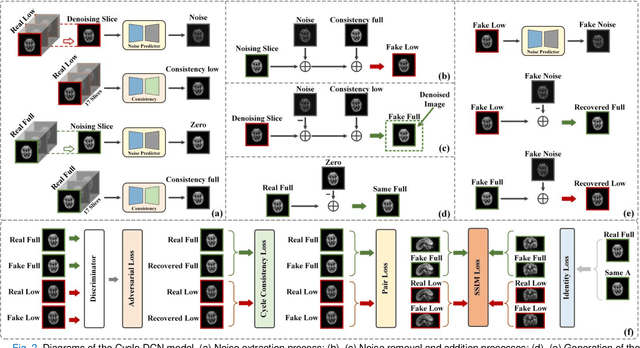
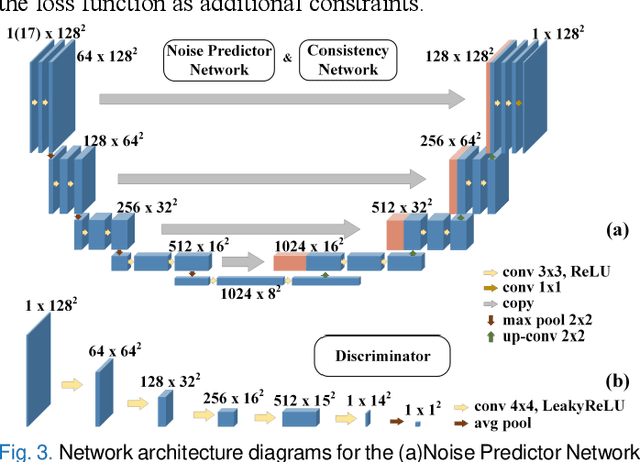
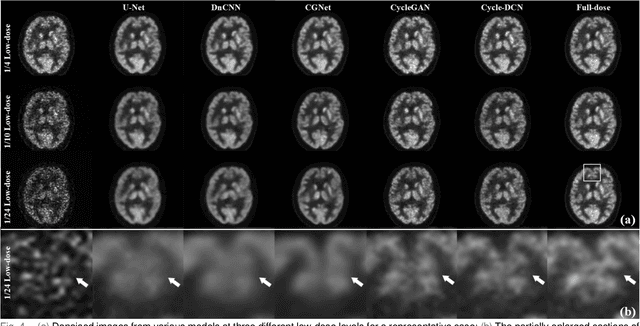
Abstract:Positron emission tomography (PET) is a critical tool for diagnosing tumors and neurological disorders but poses radiation risks to patients, particularly to sensitive populations. While reducing injected radiation dose mitigates this risk, it often compromises image quality. To reconstruct full-dose-quality images from low-dose scans, we propose a Cycle-constrained Adversarial Denoising Convolutional Network (Cycle-DCN). This model integrates a noise predictor, two discriminators, and a consistency network, and is optimized using a combination of supervised loss, adversarial loss, cycle consistency loss, identity loss, and neighboring Structural Similarity Index (SSIM) loss. Experiments were conducted on a large dataset consisting of raw PET brain data from 1,224 patients, acquired using a Siemens Biograph Vision PET/CT scanner. Each patient underwent a 120-seconds brain scan. To simulate low-dose PET conditions, images were reconstructed from shortened scan durations of 30, 12, and 5 seconds, corresponding to 1/4, 1/10, and 1/24 of the full-dose acquisition, respectively, using a custom-developed GPU-based image reconstruction software. The results show that Cycle-DCN significantly improves average Peak Signal-to-Noise Ratio (PSNR), SSIM, and Normalized Root Mean Square Error (NRMSE) across three dose levels, with improvements of up to 56%, 35%, and 71%, respectively. Additionally, it achieves contrast-to-noise ratio (CNR) and Edge Preservation Index (EPI) values that closely align with full-dose images, effectively preserving image details, tumor shape, and contrast, while resolving issues with blurred edges. The results of reader studies indicated that the images restored by Cycle-DCN consistently received the highest ratings from nuclear medicine physicians, highlighting their strong clinical relevance.
FedDCT: A Dynamic Cross-Tier Federated Learning Scheme in Wireless Communication Networks
Jul 10, 2023Abstract:With the rapid proliferation of Internet of Things (IoT) devices and the growing concern for data privacy among the public, Federated Learning (FL) has gained significant attention as a privacy-preserving machine learning paradigm. FL enables the training of a global model among clients without exposing local data. However, when a federated learning system runs on wireless communication networks, limited wireless resources, heterogeneity of clients, and network transmission failures affect its performance and accuracy. In this study, we propose a novel dynamic cross-tier FL scheme, named FedDCT to increase training accuracy and performance in wireless communication networks. We utilize a tiering algorithm that dynamically divides clients into different tiers according to specific indicators and assigns specific timeout thresholds to each tier to reduce the training time required. To improve the accuracy of the model without increasing the training time, we introduce a cross-tier client selection algorithm that can effectively select the tiers and participants. Simulation experiments show that our scheme can make the model converge faster and achieve a higher accuracy in wireless communication networks.
 Add to Chrome
Add to Chrome Add to Firefox
Add to Firefox Add to Edge
Add to Edge